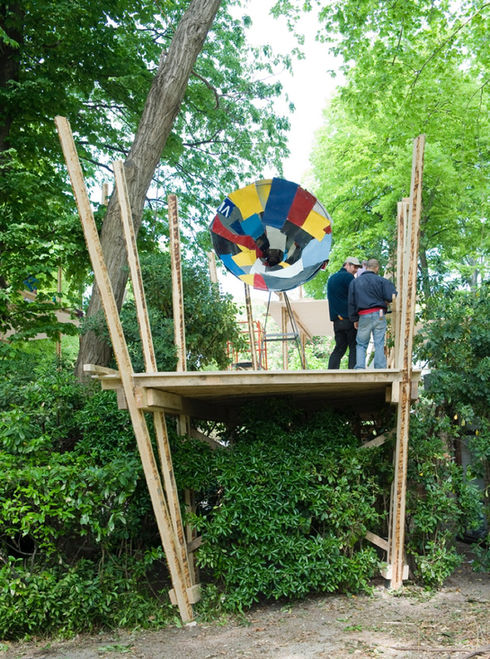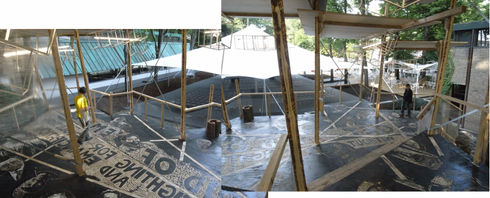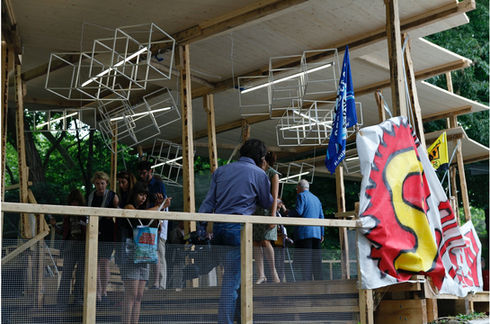DANISH PAVILION
54th Venice Biennale
Speech Matters
04.06. — 27.11.11
Participating artists: Agency | Ayreen Anastas & Rene Gabri | Robert Crumb | Stelios Faitakis | FOS | Sharon Hayes | Han Hoogerbrugge | Mikhail Karikis | Thomas Kilpper | Runo Lagomarsino | Tala Madani | Wendelien van Oldenborgh | Lilibeth Cuenca Rasmussen | Taryn Simon | Jan Švankmajer | Johannes af Tavsheden | Tilman Wendland | Zhang Dali
For the 54th Venice Biennale, the Danish Pavilion hosted an international group exhibition, curated by Katerina Gregos, which explored the very timely and complex issue of freedom of speech. The question of freedom of speech is one that is being increasingly contested in light of transformations taking place globally, both in authoritarian regimes and in liberal democracies, where civil liberties seem to be increasingly under threat. Apart from the fact that it relates to Denmark specifically, it is also highly relevant in relation to much of what is happening in many countries in the world today, from: press intimidation and censorship in Russia and elsewhere; to Google’s recent episode in China; current events in North Africa; changes to media law in Hungary; the WikiLeaks scandal; and other factors such as increased surveillance in the UK and the USA, and highly charged debates about the limits of freedom of speech in several European countries, such as the Netherlands. The notions of freedom of speech and freedom of expression also impact upon, and are interrelated with, other areas such as the freedom of the press, censorship and self-censorship, the internet, copyright, intellectual property, the privatisation of knowledge, protest and public order, public space, judicial and legal questions, pornography, sexual orientation, lifestyle preferences, and human rights issues in general. It is important to point out that the understanding of ‘freedom of speech,’ in this context is not only in relation to the spoken word per se but also to inextricably interrelated issues of freedom of artistic expression. The exhibition in the Danish Pavilion aimed to complicate the issue of freedom of speech, which seems, increasingly, to be used as an empty political slogan that is subjected to a very simplified, biased and populist debate. Denmark has a longstanding reputation of freedom of speech and freedom of press. It has always been at the forefront of the public debate on a number of progressive issues in relation to freedom of speech; but it has also suffered the so-called ‘trauma of free speech,’ making it even more appropriate to use the Danish Pavilion as a springboard from which to discuss these issues.
SPEECH MATTERS featured 18 international artists of different generations from 12 countries. 13 new installations and works have been commissioned specially for the exhibition.
Works Extra Muros:
Apart from the works exhibited inside the Danish Pavilion, three of the artists created large outdoor commissions. The German artist Thomas Kilpper constructed a Pavilion for Revolutionary Free Speech, built in, and beyond, the private garden of the Danish Pavilion. The structure also hosted Speakers’ Corner, an open balcony and public podium where a series of specially commissioned language-based performances and speech acts on the subject of free speech took place during the opening days and after. On the façade of the Danish Pavilion, the Greek artist Stelios Faitakis realised Imposition Symphony, an ambitious large-scale mural in six chapters whose main narrative revolves around six episodes all relating to questions of freedom of speech, freedom of expression, censorship and oppression, from a contemporary as well as historical perspective.
Finally, the Danish Pavilion extended its presence outside the Giardini and in the public urban fabric of Venice itself, through the work of the Danish artist FOS, who realized Osloo—a floating Pavilion, which incorporated a bar, a radio station and a stage for concerts, talks, and lectures. Entrance to Osloo was free for the public and a daily programme was offered throughout the first month of the Biennale. See: www.olsoo.dk
The Catalogue:
The exhibition catalogue was designed and produced by Mousse. It featured contributions by Katerina Gregos, Christopher Hitchens, Antonio Negri, and Raoul Vainegem.
The Commissioner:
The Danish Arts Council Committee for International Visual Arts serves as Commissioner for the Danish Pavilion at the Venice Biennale, where Denmark has taken part since 1895.
SPEECH MATTERS received generous additional support from Messieurs Spyros & Philip Niarchos, Beckett-Fonden, Montana, The Flemish Government Agency for Arts and Heritage, Mondriaan Foundation, Institut für Auslandsbeziehungen e.V, Vidisquare, and Basedesign.
Individual artist presentations in SPEECH MATTERS were supported by Andersen’s Contemporary, Copenhagen; The Breeder, Athens; Pilar Corrias Gallery, London; Culture Programme of the European Union; dispari&dispari projects, Reggio Emilia; DSV; Gagosian Gallery; Nonino Distillatori; Hammerthor; Patrick Heide Contemporary Art, London; If I Can’t Dance, I Don’t Want To Be Part Of Your Revolution, Amsterdam; Kvadrat; Landeshauptstadt München Kulturreferat; Wilfried Lentz Gallery, Rotterdam; Lombard-Freid Projects, New York; Montana; Galerie Christian Nagel, Cologne/Berlin; Nastro Azzurro; Messieurs Spyros & Philip Niarchos; Almine Rech Gallery Paris/Brus¬sels; Salong; Showroom, London; Max Wigram Gallery, London.















